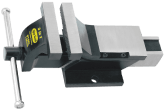For generations, anvils have played a crucial role in metalworking, serving as foundational tools for flattening, shaping, and cutting metal. Their heavy-duty build enables them to endure constant hammering, making them essential for forging, bending, and other metal manipulation processes. Successfully working with an anvil demands not only skill and technique but also the right set of companion tools. At Ajay Tools, we offer a diverse selection of anvils in various sizes and weights, engineered to deliver smooth, refined metal surfaces after precise shaping.
Why is it important to choose a high-quality anvil?
A well-manufactured anvil is a cornerstone of effective metalworking, offering a reliable and long-lasting surface for hammering, shaping, and forming metal with precision. It enables controlled and efficient metal deformation, helping the metalworker achieve precise shapes and structures with ease.
- Stable Work Surface
Anvils offer a firm and stable base that prevents shifting or flexing, allowing the metalworker to concentrate on manipulating the metal rather than adjusting to an unstable surface. - Precise Metal Shaping
The anvil’s mass and hardness absorb the impact of each hammer strike, giving the metalworker better control over how and where the metal deforms. - Efficiency and Precision
A well-made anvil requires less force to shape metal and improves the accuracy of the process, making the work both faster and more precise. - Durability and Longevity
A reliable anvil should withstand repeated hammering and heavy use without deteriorating, offering long-lasting performance and dependability. - Versatility
Different anvils cater to specific tasks, from general forging to specialized tasks, making them adaptable for various metalworking needs. - Rebound
An anvil’s rebound (its ability to bounce back after a hammer blow) is key to efficient hammering. A good anvil will have an excellent rebound, conserving energy and allowing for more accurate control during the process.
What is the role of an anvil in metalworking?
Anvils feature a robust, stable surface that supports the controlled manipulation of metal through repeated hammering. Their solid construction absorbs the force of each strike, giving metalworkers precision in shaping and structuring their materials. The flat face of the anvil is ideal for general forging, while the horn and integrated holes offer versatility for more specialized techniques. Below are some common tasks that can be performed using an anvil:
- Shaping material: The horn of an anvil serves as a key feature for bending and curving metal. Its conical, tapered shape makes it ideal for forming smooth, rounded angles and contours. This part of the anvil is especially valuable when crafting curved components, allowing for controlled, gradual shaping during the forging process.
- Flattening metal: The flat face of the anvil provides a stable surface for flattening metal. Striking the material on this smooth area helps metalworkers even out the surface, adjust thickness, and achieve a uniform finish. This step is crucial in preparing metal for subsequent shaping or assembly, as a level surface ensures better alignment and stronger joins in the final construction.
- Cutting material: The hardy hole in the anvil is used to hold several cutting tools. To cut material, metalworkers place the material over the hardy cutter, which is held in the hardy hole, and they strike it with a hammer to achieve a precise cut. When you are looking to cut a material, you can also use a work bench with vice. A material is placed between the jaws of the vice to perform the cutting operation.
- Punching holes: The pritchel hole on an anvil is specifically designed for punching holes into metal workpieces. By positioning a punch tool over this hole and striking it with a hammer, precise openings can be made in the material. This method is commonly used to create holes for rivets, bolts, and other necessary fittings in metal components.
Conclusion
When using an anvil, ensure you know its parts and functioning so you can perform the required tasks efficiently. Ensure to choose the best quality anvil from a trusted anvil tool manufacturer like Ajay Tools. You can explore anvil tools of different sizes and weights at Ajay Tools.


